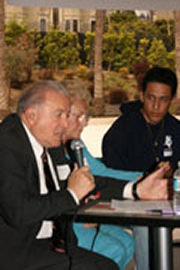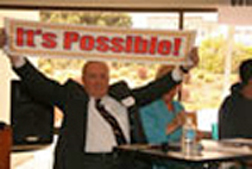Day of Learning: San Francisco 29 April 2007

Holocaust survivors George and Iby Heller were introduced by David Aptaker, one of the participants of the Shalhevet 2007 program (photos from Trip to Poland & Israel: 5-19 March 2007).
Through a series of questions and answers they provided a brief overview of some of their experiences during the Holocaust. The questions and answers are reproduced below. The Day of Learning also featured a specially designed educational handout program, “Everyone has a Name” that included Holocaust vintage photographs of George and Iby.
George Heller was born and grew up in Budapest, Hungary. He was a slave laborer in Budapest, until his deportation to Burgenland, Austria in the fall of 1944. In Austria he was a slave laborer under the Waffen SS. He arrived in the Concentration Camp of Mauthausen following a death march during Passover of 1945. George was liberated by the American Army from the Gunskirchen death camp, a sub camp of Mauthausen on May 5th 1945.
Iby Heller was born in Brussels, Belgium. Her parents moved from Hungary to Belgium in the late 1920’s, because of the anti-Jewish laws in Hungary her father could not pursue his engineering education there. When Germany attacked Belgium in 1940, Iby and her family fled instantly, left everything behind and escaped to France and then to England where her father joined the Czechoslovakian Free Forces. At the end of World War II, they returned to Belgium. In1948 they moved to Paraguay, and in 1952, Iby came to the United States.
Questions:
- Iby: Can you tell us how it felt to be a Jew in Europe as the Nazis came to power?
- I was born in Belgium. I always knew that I was Jewish, but also knew that this was something that you did not talk about. We lived as assimilated Belgians. When Hitler came into power in Germany, things did not really change for us. But we were very much aware of some of what was happening in Germany, Austria and Czechoslovakia and my Father was very active in helping relatives escape out of Austria and come to Belgium.
- George: Do you remember any anti-Semitism in Hungary before you were deported? Can you share an example?
- Hungary had an anti-Jewish law passed in 1919, fourteen year before Hitler came to power in Germany. Jews were severely restricted from entering universities. After I graduated from high school, I was apprenticed to learn a trade. I became a typesetter in my father’s print shop. After Hitler came to power, several anti-Jewish laws were passed that made life for Jews in Hungary increasingly difficult. One Friday night 1942, at the end of the service, a bomb was thrown at the Synagogue I attended that night. I was lucky. I was not among the injured/
- Iby: Can you tell us how and why your family left Belgium?
- When Belgium was invaded by Germany in May of 1940 my Father did not hesitate a moment. He knew that we had to flee immediately, away from the Germans.
He said, “Into the car, we are leaving right now”. We left taking just what was on our backs and a few change of clothes. We went south towards France until we reached Paris. We thought surely the French would put up some resistance. France surrendered shortly after. We again packed into our car and went south. This time the roads were jammed with people running away from Paris in which ever way they could, walking, pushing baby carriages, on bicycles, by car. As we were trying to escape, Germans were machine gunning us from the air.
- George: Can you tell us about the conditions riding in the cattle cars on the train?
- There were eighty of us in a box car, for three days; with only enough room to stand. There were no bathroom facilities. Someone had a metal can that was passed around and used by people to void. There was no help for people with more severe bathroom needs. We got no food or water while we traveled for these three days. The train stopped several times, and the dead were taken off, left beside the railroad tracks and the train continued.
- George: Can you share with us the experience of arriving at the first camp?
- The train I was on was transporting slave laborers from Hungary to Austria. We were separated from our families earlier when we were ordered into the labor camps. When we arrived at our destination, all of us relatively strong men, 150 of us were counted and we were marched to a barn. This is where we stayed until the end of March. We were now under the Waffen SS. No barbed wires, just no way to escape.
- George: You were taken on a death march to Mauthausen. What did that involve and how do you think you survived?
- We started on the first day of Passover, the 28th of March 1945. We were moved West as the Russian army approached from the East. We carried on our backs the little we still owned: a change of underwear, a blanket and a dish in which we could receive food. There was no food. When we stopped I found some grass and ate it. Grass can taste very good when you are starving. Who ever could not keep up was shot and killed on the spot, and there were many dead bodies left behind along the way.
- George: You told us about the hill at Mauthausen and how that experience changed you and your outlook on life. Can you share with the group?
- I expected to die as we disembarked from the boat that brought us to Mauthausen, following our march. We were given no food nor water for eight days. I was convinced that I would be killed by machine guns either at the bottom of the hill, or at the top of the hill. There were no machine guns and I survived. Days later, as several of us stood and talked, one of my friends could no longer bear the starvation and horrors of Mauthausen. He said “I cannot take this any longer. I have no hope of surviving.” As he said this, he dropped to the floor and died right there and then. I learned an unforgettable lesson that day. Giving up hope and faith can actually kill you.
- Iby: What are the lessons you want us to walk away with after our studies of the Holocaust in Poland?
- What lessons have I learned? Resiliency, Flexibility and accept what I cannot change. At a very early age I learned that possessions are not important, people are. During the late 30’s we begged my grandparents in Czechoslovakia to leave everything behind and just come to us in Belgium. They said that they could not possibly leave all their belongings and besides their neighbors loved them. Because they could not leave their possessions behind, they perished.
- Iby: The two of you just traveled with 23 high school juniors and seniors for two weeks. How was that? Different than you expected?
- When the idea of joining Shalhevet on a journey of learning to Poland and Israel first came up, I was quite hesitant. I wondered how much these 17 and 18 year olds really wanted to know about our experiences.
I very soon found out, that yes indeed, the participants really wanted to know and learn. That is why they were on this journey.
During our two weeks together, we shared many experiences. We laughed and we cried together. We were there for each other. The students were there for us and we, for them.
After two weeks of sharing, I came home convinced that our future is left in very capable and caring hands.
- George: What is the one message you want to leave with us today?
- My one message is: It’s Possible. When I was liberated from Gunskirchen, I was 21 years old, and weighed approximately 80 pounds. I had known starvation and sickness and I was homeless in a foreign land. If on that day, sixty two years ago, someone described to me my life in America today, I would have said, there is no way to get from there to here. Yet we are having this conversation here today, sixty two years later, in beautiful San Francisco. Perhaps, just perhaps it is possible.
George held up a four foot banner:

Heller Web Space:
Images
- Notes
- Travel
- Memories


